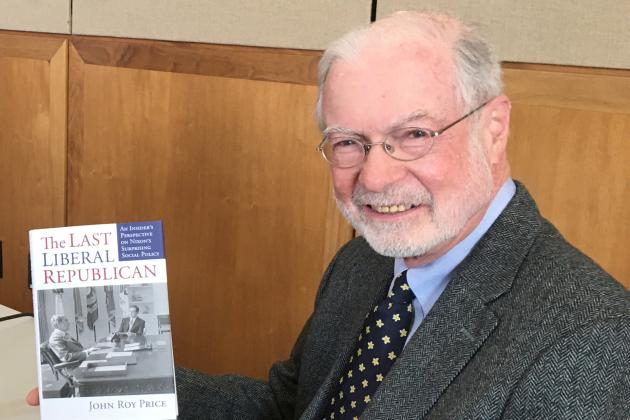Thank you, Kurt [Hauser].
I was honored to be invited to your education symposium later this week, and I very much appreciate your flexibility in allowing me to speak to your board today instead. I would also like to acknowledge John Raisian and "Checker" Finn who have been leading your Koret Task Force on K–12 education.
The Hoover Institution has long had a focus on improving student achievement in our schools, and I thank you for continuing to make our children your priority. Of course, rising student achievement has been my passion as well. The same year you established the Koret Task Force on K–12 education—1999—we in Florida began our A+ Plan for education, the beginning of our challenging, but successful, journey in Florida.
Today I am going to share with you the experiences of the last four years, as well as our vision and our ambitions for the next few years.
We started with two principles: Every child can learn, and No child must be left behind. This sounds trite these days, but I can assure you that even today in Florida and across the country there remains an underlying premise that some kids can learn and some cannot do as well. That premise many times yields excuses and what my brother calls "the soft bigotry of low expectations."
And we started with one cIear goal—to improve student achievement across our state—in every grade, at every school, and within every ethnic and socioeconomic group. If we did this, we knew we would get the best return on every tax dollar spent on education and we would secure greater opportunity for all our children.
And so, through the A+ Plan, we implemented reforms. First, we focused on outcomes rather than inputs. We have increased funding for K–12 education in Florida, and I'm proud of that. But funding alone can't solve anything. We needed to focus on results.
To do that, we needed to evaluate our schools and our students, so we used the FCA T test, the Florida Comprehensive Assessment Test, in a new way. The FCAT had already been put in place several years earlier to measure student achievement in reading, writing, and math.
Then, based on the FCAT scores compared to our standards and learning gains of the students, we devised a way to assess whole schools: We assigned a letter grade—A, B, C, D, or F—for every public school In Florida. So the first major reform was assessing performance.
The second major reform was holding schools accountable for performance. We did this in two ways. First, with a carrot, we rewarded improving and high-performing schools by recognizing those schools that improved by a letter grade or more or that maintained their "A" grade. We awarded them $100 per student to fund teacher bonuses or other initiatives.
Second, we also implemented a stick. The A+ Plan provides that if any school earns an "F" grade twice in four years, the next year, its students are eligible for vouchers—which we called opportunity scholarships—to attend another public or private school of their parents' choice.
By the way, we don't just have one voucher program in Florida, we have three of them: one for students diagnosed with learning disabilities, one for economically disadvantaged students paid for through a $50 million corporate tax credit program, and our opportunity scholarships for parents who want alternatives to chronically low-performing schools.
Combined, these three programs are providing educational choice to over 25,000 students in our state.
We believe in educational choice as a matter of principle, and we believe in school accountability as a matter or principle as well. And we believe they go hand in hand.
But the results of these reforms are what are truly important because we no longer have to engage in this debate on the basis of principle alone. We have results that prove they work.
And even more important, these results show a generation of children in our state who are learning the skills they need to succeed in life. That's the real achievement, and that's what we hope will inspire other states as they embark on this journey as well.
I am going to share with you some of Florida's results in two areas—schools and students. First, schools.
In 1999, there were 78 "F" schools in Florida. That number dropped to four the next year and to zero the year after that.
We believe that the incentives of school improvement funds (the carrot) and opportunity scholarships (the stick) played a major role here because unless you define failure, and unless success and failure have real consequences, success won't be achieved to the level desired.
But I want to emphasize something even more encouraging that we've seen in Florida: the teachers, parents, and students in low-performing schools want to improve. They want to do better. They want their kids to succeed.
This last year has been particularly instructive in our state. As I said, the number of "F" schools dropped to zero by the third year of the A+ Plan, proving that public schools were capable of meeting the challenge of accountability.
So we raised the bar. We strengthened school grading standards with an emphasis on reading, and one result of that was that we had "F" schools again, 64 in all.
But an interesting thing is happening. We had seen over the previous years that no school is doomed to fail, that every "F" school was able to improve through hard work and by refocusing on student achievement. And so we created the Assistance Plus program last summer.
The idea was simple. In addition to providing the additional funding and support that "F" schools have traditionally received, we would also provide them role models—examples of schools that had been there before but turned their programs around.
Every "F" school in Florida has now been partnered with another school having similar demographics and challenges.
Just last month I attended an Assistance Plus conference to encourage "F" school principals in their ongoing efforts to reform their schools. The stories have been encouraging.
Immokalee High School in Collier County, for example, was an "F" school last year. Through Assistance Plus they were paired with Miami Lakes Education Center. Miami Lakes shared successful reading strategies with lmmokalee that were implemented schoolwide, such as mentoring and reading coaches. lmmokalee also took this a step further by focusing on a specific strand of reading every month, such as "Words and Phrases" in August and "Main Idea Plot and Purpose" in September. They assessed performance every month and compared it with the baseline for each student.
The results have been very encouraging. Based on reading performance indicators, targeted standard curriculum students —those identified at reading below grade level initially—are showing average growth in their reading ability of two years. Even ESE (students with learning disabilities) are showing progress, improving by almost a year's worth of progress in just a few short months.
There are 64 stories being written right now in our state, and lmmokalee High is just one of them. Teachers are receiving bonuses to go into the "F" schools, more money in general is going into "F" schools, and new partnerships are being formed with the faith-based community. I also cannot express enough my admiration for the teachers, the parents, the principals, and the entire communities that have rallied behind each of these schools.
I ask each of you to help me get the word out—school accountability does not mean labeling schools and then washing our hands of them. School choice does not mean leaving some students behind in failing schools. What we have seen in Florida is that low-performing schools are turning themselves around. We have proven that if you define success, if you reward success, if you encourage success, our public schools can achieve it.
But of course, schools are just a part of the accountability story. The true purpose of any education system is to ensure that children are mastering the skills they need to succeed.
Unfortunately, mastering skills is not the priority when children automatically advance grade to grade based on social promotion.
Social promotion is a cancer in our education system. It undermines the concept of student achievement by allowing birthdays—rather than skill levels—to determine the rate of advancement. It is also a cruel thing to do to a child. Many proponents of social promotion claim that holding a child back a year harms that child's self-esteem, but I believe that social promotion doesn't do a child any favors. Work gets harder in the higher grades and students that have not yet mastered the basics have much less chance of learning new, advanced material.
In Florida, we now are addressing social promotion in two ways. First, third graders will not be promoted to fourth grade if they score at the lowest level (Level l) on the FCAT Reading Test. This is because the research shows that, through third grade, students learn to read, but from fourth grade on, students read to learn. Yes, we have alternative assessments, but the Mack truck-wide loophole has been narrowed dramatically.
Second, we have toughened standards for graduation from high school. Beginning this school year, students will not receive a diploma unless they can pass the tenth-grade FCAT test.
We want to ensure that a Florida high school diploma means that a student has mastered a course of study, not that he or she has merely turned 18.
Cracking down on social promotion does not mean giving up on students who struggle. Far from it. It actually requires earlier identification and intervention for students who can't read in kindergarten, first and second grade. And third graders who are struggling with reading should be remediated immediately, receiving extra focus and attention to build the skills they need. And tenth graders who do poorly on the FCAT have six additional opportunities to pass it before graduation.
But the bottom line is that Florida's public schools will no longer be allowed to wash their hands of a child they feel cannot be taught. Every child can learn. All of our accountability efforts rest on that principle.
The good news is that, because of these accountability measures, student achievement is indeed on the rise in our state.
Using FCAT scores, we can see rising student achievement over the last four years in both reading and math.
Now you can measure rising student achievement in several ways. You can track the percentage of students scoring at the lowest level (FCAT Level 1) and look for those numbers to drop. You can also track the percentage of students performing at grade level or better (FCAT Levels 3 to 5) and look for those numbers to increase.
Also, beginning this year, we have been able to track individual students and assess their annual learning gains.
This helps us identify those students who may still be achieving below grade level but who have made progress after starting out far behind.
The results? Over the past four years, FCAT reading scores have improved in all the grades we have been testing since the inception of the A+ Plan; the fourth, eighth, and tenth grades.
Let me give you several examples. In 1999, 26 percent of fourth grade African American students were reading at grade level. Four years later, 42 percent of African American students are reading at grade level. Hispanic fourth graders went from 41 percent to 56 reading at grade level in four years.
White students reading at grade level increased from 67 percent to 74 percent. We have seen increases in every group at
every level.
They have even improved—although very slightly—among ESE (Learning Disabled) and LEP (Limited English Proficient) students as well. Math improvements have been similar in terms of the gain.
And we just received some additional good news this month about our FCAT test. Some of our critics were saying that all the FCAT measures is test-taking ability. They said that we were forcing teachers to "teach to the test." However, a new Manhattan Institute study shows that the FCAT is a reliable measure of student achievement and that our teachers are teaching the subject matter students need to learn—not teaching test-taking skills.
Here are the facts. If you do well on the reading portion of the FCAT, you can read. If you do well on the math portion, you can do math.
Make no mistake. We still have a long way to go in Florida. Student achievement is rising, but it is nowhere near high enough.
One final point: there is a myth that lower-performing schools get less money. The A+ Plan has proven that the myth is incorrect. In 2001-2002, "F" schools received $1,044 more dollars per student than "A" schools. These differences are in total funding—federal, state, and local. If we only look at state and local dollars, "F" schools still receive $621 more dollars per student than "A" schools. Money is not a leading indicator of student achievement.
Finally, I want to share with you Florida's vision for the future. And that is to make reading an enduring core value of our state.
We have always known that reading skills are the foundation of a quality education, but today we have new research--the best research that has ever been done—to guide us on how to build literacy skills among our children.
Our goal is very ambitious: to have every Florida child reading on grade level or better by 2012.
Inside the classroom, our efforts are focused on professional development for teachers, so that they are trained in ways that will help them connect with their students better and remediate those students who are struggling with their reading. We anticipate that 50,000 K-3 teachers will receive training in the new methods by 2005.
We have also created a public-private partnership with textbook publishers who have agreed to provide up to 100 hours per teacher of professional development in the districts that purchase their materials.
Outside the classroom, we are implementing several partnerships to get parents, mentors, and community leaders all focused on our statewide goal.
For parents, we have provided many resources to help them reinforce at home the lessons kids are learning in school. But most important, we've created an "I'm A Reader Kit", which is given to the parents of every newborn in Florida right there at the hospital. It gives parents tips on how to build early literacy skills, so their children will be successful readers later in life.
It also emphasizes that reading is a child's first subject and that parents are a child's first teachers. We did this through a public-private partnership with Carnival Cruise Lines and Scholastic Books.
We are also building upon our very successful mentoring efforts by prioritizing reading here as well. One of my favorites is the Teen Trendsetter Program, in which high school students are trained to recruit twenty or more of their peers to serve as reading mentors for third-grade students.
We had 30 Teen Trendsetters last year, and we'll soon have 200 more, thanks to another public-private partnership. Our hope is to have every high school in Florida with a Teen Trendsetter and 20 mentors. This will mean that over 10,000 mentors will have an impact on lower-performing third grade readers.
That's a rough outline of where we've been and where we're going in Florida.
Your symposium topic on Wednesday is "Our Schools and Our Future: Are We Still At Risk?" My simple answer to this question is "Yes."
Don't get me wrong. I am very optimistic about the future of education, particularly in Florida. But there will never be a day when we can take rising student achievement for granted, so we must continually rededicate ourselves to making this a priority.
With the support of the Hoover Institution and your task force, I know we will.
Thank you.









